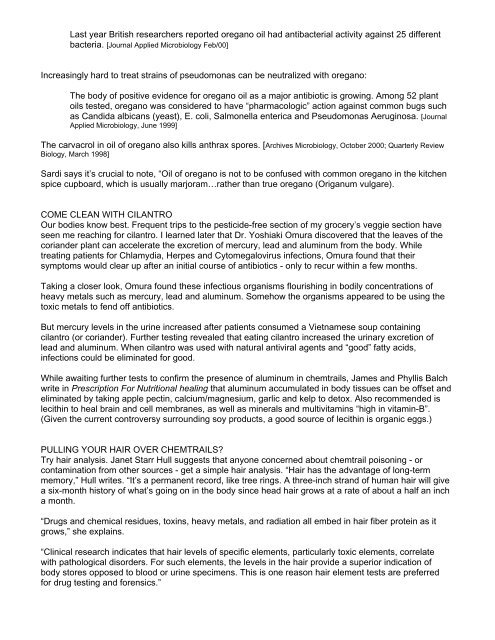CHEMTRAILS%20-%20CONFIRMED%20-%202010%20by%20William%20Thomas
CHEMTRAILS%20-%20CONFIRMED%20-%202010%20by%20William%20Thomas
CHEMTRAILS%20-%20CONFIRMED%20-%202010%20by%20William%20Thomas
Create successful ePaper yourself
Turn your PDF publications into a flip-book with our unique Google optimized e-Paper software.
Last year British researchers reported oregano oil had antibacterial activity against 25 different<br />
bacteria. [Journal Applied Microbiology Feb/00]<br />
Increasingly hard to treat strains of pseudomonas can be neutralized with oregano:<br />
The body of positive evidence for oregano oil as a major antibiotic is growing. Among 52 plant<br />
oils tested, oregano was considered to have “pharmacologic” action against common bugs such<br />
as Candida albicans (yeast), E. coli, Salmonella enterica and Pseudomonas Aeruginosa. [Journal<br />
Applied Microbiology, June 1999]<br />
The carvacrol in oil of oregano also kills anthrax spores. [Archives Microbiology, October 2000; Quarterly Review<br />
Biology, March 1998]<br />
Sardi says it’s crucial to note, “Oil of oregano is not to be confused with common oregano in the kitchen<br />
spice cupboard, which is usually marjoram…rather than true oregano (Origanum vulgare).<br />
COME CLEAN WITH CILANTRO<br />
Our bodies know best. Frequent trips to the pesticide-free section of my grocery’s veggie section have<br />
seen me reaching for cilantro. I learned later that Dr. Yoshiaki Omura discovered that the leaves of the<br />
coriander plant can accelerate the excretion of mercury, lead and aluminum from the body. While<br />
treating patients for Chlamydia, Herpes and Cytomegalovirus infections, Omura found that their<br />
symptoms would clear up after an initial course of antibiotics - only to recur within a few months.<br />
Taking a closer look, Omura found these infectious organisms flourishing in bodily concentrations of<br />
heavy metals such as mercury, lead and aluminum. Somehow the organisms appeared to be using the<br />
toxic metals to fend off antibiotics.<br />
But mercury levels in the urine increased after patients consumed a Vietnamese soup containing<br />
cilantro (or coriander). Further testing revealed that eating cilantro increased the urinary excretion of<br />
lead and aluminum. When cilantro was used with natural antiviral agents and “good” fatty acids,<br />
infections could be eliminated for good.<br />
While awaiting further tests to confirm the presence of aluminum in chemtrails, James and Phyllis Balch<br />
write in Prescription For Nutritional healing that aluminum accumulated in body tissues can be offset and<br />
eliminated by taking apple pectin, calcium/magnesium, garlic and kelp to detox. Also recommended is<br />
lecithin to heal brain and cell membranes, as well as minerals and multivitamins “high in vitamin-B”.<br />
(Given the current controversy surrounding soy products, a good source of lecithin is organic eggs.)<br />
PULLING YOUR HAIR OVER CHEMTRAILS?<br />
Try hair analysis. Janet Starr Hull suggests that anyone concerned about chemtrail poisoning - or<br />
contamination from other sources - get a simple hair analysis. “Hair has the advantage of long-term<br />
memory,” Hull writes. “It’s a permanent record, like tree rings. A three-inch strand of human hair will give<br />
a six-month history of what’s going on in the body since head hair grows at a rate of about a half an inch<br />
a month.<br />
“Drugs and chemical residues, toxins, heavy metals, and radiation all embed in hair fiber protein as it<br />
grows,” she explains.<br />
“Clinical research indicates that hair levels of specific elements, particularly toxic elements, correlate<br />
with pathological disorders. For such elements, the levels in the hair provide a superior indication of<br />
body stores opposed to blood or urine specimens. This is one reason hair element tests are preferred<br />
for drug testing and forensics.”


